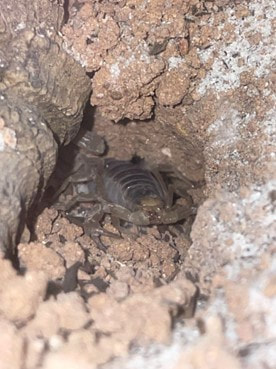Desert Hairy Scorpion (Hadrurus arizonensis) Care Information
Jenifer L. Nix, BVSc, MFAS, CertAqV
Basic Information: The desert hairy scorpion (Hadrurus arizonensis) is a large species of scorpion native to the southwestern United States and Mexico (2). The species is found in the Mohave and Sonoran deserts of Arizona, California, Nevada, Utah, Baja California, and the Norte Areas of Mexico (2). Desert hairy scorpions can grow up to 6 inches in length (1,2). Females will live up to 20 years, while males can live up to 10 years (1). Scorpions will mature within 5 to 6 molts over several years (2). Females will produce 25-35 young that will remain with them for several molts before dispersing on their own (2). Desert hairy scorpions are nocturnal, like most scorpion species (2). They prefer to spend their time in shallow burrows (2).
Handling: The venom of the desert hairy scorpion is mild and not medically significant (2). However, it is not recommended that you handle any scorpion, as there is the potential for it to pinch or sting. There are other safety risks for the animal, as it can fall and become injured, or it can become injured if it stings. If the scorpion must be moved to another enclosure or removed for another purpose, a cup can be placed in front of the scorpion, and it can gently be prodded into the cup by touching the telson (tail) with a small paint brush.
Jenifer L. Nix, BVSc, MFAS, CertAqV
Basic Information: The desert hairy scorpion (Hadrurus arizonensis) is a large species of scorpion native to the southwestern United States and Mexico (2). The species is found in the Mohave and Sonoran deserts of Arizona, California, Nevada, Utah, Baja California, and the Norte Areas of Mexico (2). Desert hairy scorpions can grow up to 6 inches in length (1,2). Females will live up to 20 years, while males can live up to 10 years (1). Scorpions will mature within 5 to 6 molts over several years (2). Females will produce 25-35 young that will remain with them for several molts before dispersing on their own (2). Desert hairy scorpions are nocturnal, like most scorpion species (2). They prefer to spend their time in shallow burrows (2).
Handling: The venom of the desert hairy scorpion is mild and not medically significant (2). However, it is not recommended that you handle any scorpion, as there is the potential for it to pinch or sting. There are other safety risks for the animal, as it can fall and become injured, or it can become injured if it stings. If the scorpion must be moved to another enclosure or removed for another purpose, a cup can be placed in front of the scorpion, and it can gently be prodded into the cup by touching the telson (tail) with a small paint brush.
Desert hairy scorpion in her burrow. Photo by J. L. Nix, 2024
Enclosure and Substrate: The enclosure should be longer and wider than it is tall, as this is a terrestrial species. Scorplings can be kept in small acrylic enclosures (should ideally be 4 times the length of the scorpion). Adults should be kept in a 2.5-5-gallon enclosure. Temperatures should be kept between 75-80F (1). You can achieve these temperatures with an under-tank heater placed on the side of the enclosure, but if you do use external heating, only use this with a glass enclosure and not acrylic or plastic (1). The species is arid and too much moisture can lead to fungal infections (1). Keep the bottom layer of substrate semi-damp by pouring water down one side of the enclosure once every couple of weeks, taking care to make sure the scorpion is not in the vicinity of where you are pouring the water to avoid drowning (3). Substrate can either be a mix of coconut fiber and sand (50:50), or ZooMed Excavator Clay works amazingly well and may do a better job of holding a burrow (1, 3). The author recommends keeping a shallow water dish with the scorpion. Change the water out daily.
Feeding: Scorpions are carnivores and can be fed a variety of feeder insects. It is recommended to not feed prey larger than a quarter of the length of the body. Scorplings should be fed 1-2 pinhead crickets or red runner roaches every week, backing off on the amount of food as the abdomen becomes plump (1). Adults can be fed 1-2 medium to large crickets or medium dubias every other week (1). If feeding dubias, you should crush the heads beforehand since these insects will burrow, making them inaccessible to the scorpion.
References:
Feeding: Scorpions are carnivores and can be fed a variety of feeder insects. It is recommended to not feed prey larger than a quarter of the length of the body. Scorplings should be fed 1-2 pinhead crickets or red runner roaches every week, backing off on the amount of food as the abdomen becomes plump (1). Adults can be fed 1-2 medium to large crickets or medium dubias every other week (1). If feeding dubias, you should crush the heads beforehand since these insects will burrow, making them inaccessible to the scorpion.
References:
1. Desert Hairy Scorpion (Hadrurus arizonensis) Caresheet. [Online]. The Tarantula Collective [Accessed 25 April 2024]. Available from:
https://www.thetarantulacollective.com/caresheets/desert-hairy-scorpion
2. Gouge DH, Li S, Bibbs C, Nair S. Scorpions of the desert southwest United States. The University of Arizona College of Agriculture and Life Sciences Cooperative Extension 2018 May; az1768
3. Mason T, Cobaugh AM. Husbandry & Care of Terrestrial Invertebrates (Chapter 36, Zookeeping). Zoo’s Print 2015 Dec 21; 30(2):20-30.
https://www.thetarantulacollective.com/caresheets/desert-hairy-scorpion
2. Gouge DH, Li S, Bibbs C, Nair S. Scorpions of the desert southwest United States. The University of Arizona College of Agriculture and Life Sciences Cooperative Extension 2018 May; az1768
3. Mason T, Cobaugh AM. Husbandry & Care of Terrestrial Invertebrates (Chapter 36, Zookeeping). Zoo’s Print 2015 Dec 21; 30(2):20-30.

